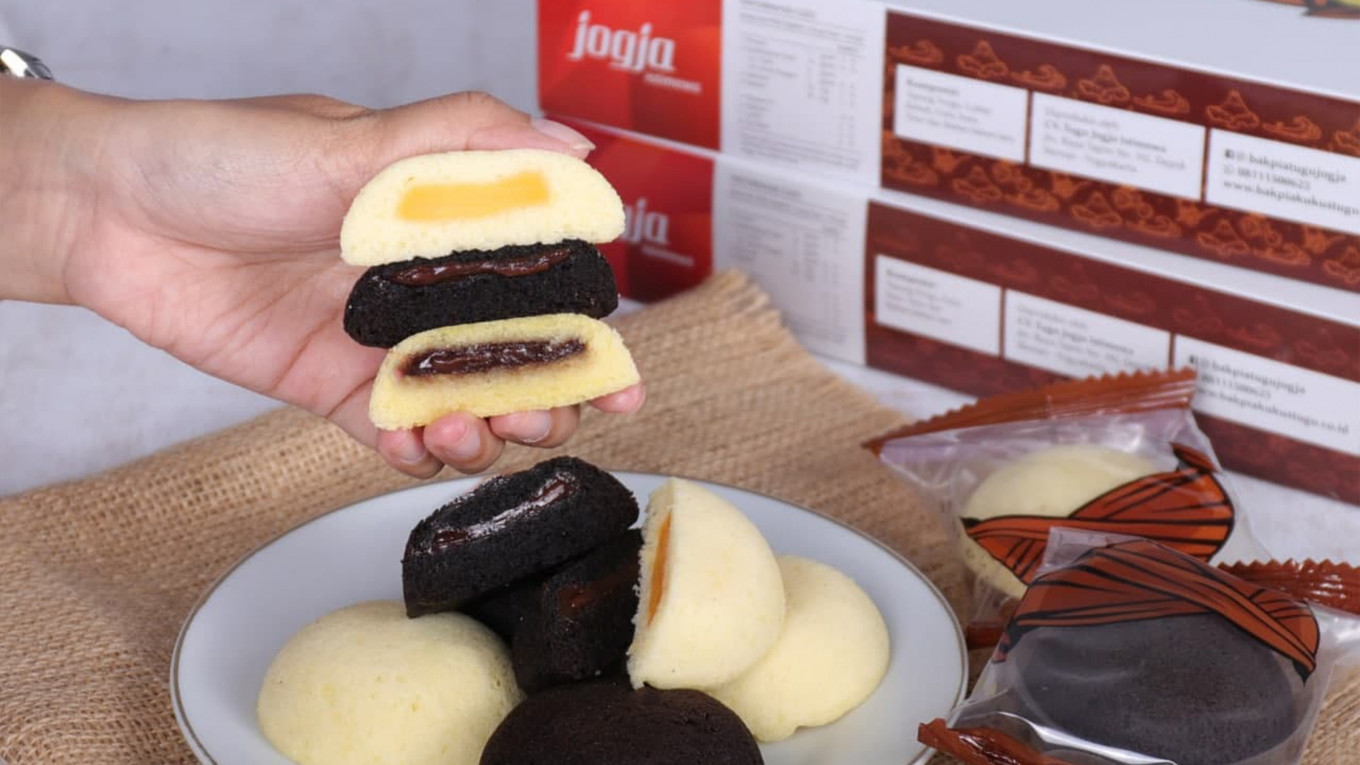Localized: Why some Indonesian F&B brands stick to a city
Business owners believe a local name can increase their sustainability, but an expert says it is a time- and capital-consuming way of building a brand.
Change text size
Gift Premium Articles
to Anyone

I
ndonesian manufacturers differ widely in how they deal with local heritage in marketing their products. Some stick with Indonesian wording for their brands, even for international offerings, as in instant noodles Indomie and herbal syrup Tolak Angin.
Others opt for words that sound more familiar to a global audience and that may help them expand overseas. Eiger outdoor equipment, Terry Palmer towels and Silver Queen chocolate bars are examples of this category.
Yet others prefer to use names that connect their products to a certain city or region of Indonesia, and none do that more than PT Agrinesia Raya, producer of food brands Lapis Bogor Sangkuriang, Bolu Susu Lembang, Bakpia Kukus Tugu Jogja and Bolu Malang Singosari.
The founder of the company is convinced that this strategy increases the sustainability of the business in each of the cities its brands are associated with.
However, a brand expert counters that it could be a needlessly laborious effort to create new brands as the company expands its business scope.
Established by a husband-and-wife couple in 2011, Agrinesia has grown from a home industry into a prominent business. It built its first factory in Sentul, West Java, five years after the inception and now has four factories, 47 outlets and more than 300 resellers in seven cities.
All of its products are marketed as oleh-oleh, or gifts Indonesians bring back with them when they return from a vacation or business trip.
"[When we started] in Bogor, we used the brand Sangkuriang, which is the name of a character from traditional [Sundanese] folklore," Agrinesia cofounder Rizka Wahyu Romadhona told The Jakarta Post on Monday.
She explained that they would look for popular types of food in each of the cities they targeted, and then develop a product in that category based on their areas of expertise. In Yogyakarta, this resulted in a bakpia-like (bean-filled pastry similar to mooncake) snack sold under the Bakpia Kukus Tugu Jogja brand.
The local character of each of Agrinesia's brands helped sustain customer demand, she said.
Some brands have turned local renown into nationwide fame despite, or because of, limiting themselves to selling locally. Spikoe Resep Kuno from Surabaya, East Java; Bolu Meranti from Medan, North Sumatra; and Bolen Kartika Sari from Bandung, West Java, are cases in point. All have existed for many years and are popular souvenirs for visitors to their respective cities.
Despite being younger, Agrinesia's brands have achieved similar popularity to those of older competitors, at least in terms of social media followers.
Read also: Our (un)conditional love for ultra-processed food
Peter Shearer, founder of food and beverages business enabler Wahyoo, defined the trend as "destination branding," whereby producers play to the fact that people want to “validate” their visit to a city by bringing back the product associated with it.
"It's not necessarily that the product is being localized. It is pure business-driven branding," Peter told the Post on Friday.
Starting from scratch, again and again
However, Bio Hadikesuma, CEO of Bio Hadikesuma Management Training and Consulting (BHMTC), said he did not recommend the usage of local names or words for branding.
"I have a principle of think big and start small, and today's business challenge is how to compete [in a] cross-border economy," Bio told the Post on Tuesday.
That said, he acknowledged that it depended on the company's vision. If a business only planned to target a certain region, it could use that region's name. But if the goal was bigger, rebranding may become necessary in the future.
"The process is not easy and needs a lot of time [and adds] costs," Bio stated.
Wahyoo's Peter agrees that building a new brand requires time and money, all the more so when taking on brands that have existed for a long time and if the new product lacks differentiation.
"New brands need time to put perceptions in people's minds. [It is hard], unless they have a lot of money and can take shortcuts by creating awareness everywhere and hiring a popular brand ambassador," Peter said.
However, using a generic name for the entire Indonesian market is not without challenges either, he added, explaining that some brands that had become associated with a certain region struggled to sell in other regions.
Agrinesia's Rizka admitted that her firm needed to put extra effort into building new brands, yet she has no plans to change her strategy.
"It gets tiring; we keep having to build everything, including a social media presence, from scratch. But we still need to keep this local character," Rizka insisted.
She recalled how Agrinesia pushed the local branding angle when it showcased Bakpia Kukus Tugu from Yogyakarta and Lapis Kukus Pahlawan from Surabaya at the Jakarta Fair.
Despite originating from the Greater Jakarta area, the company created the impression that the brands were Yogyakarta- and Surabaya-based firms presenting themselves in Jakarta.
Read also: Tempeh, cassava 'the answer’ to staple-food insecurity
Fighting local rejection
Agrinesia's Rizka said a potential challenge in expanding to a new city was locals’ “resistance” to the product.
"They may say that it is Jakarta's cake, and ask why Jakartans are coming here to take our market share," Rizka said.
Agrinesia recalled that some felt that its Bakpia Kukus was not the “real” bakpia. The firm countered this impression with a marketing campaign involving local stakeholders and sales partners to send the message that its product was a bakpia innovation.
BHMTC's Bio noted that branding was all about psychology and perception, and perception could be manipulated: "Branding is a war at the mind level."









